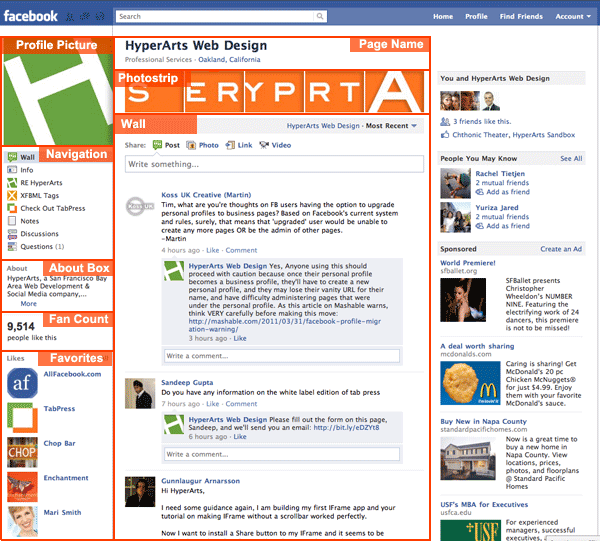This is a guest post by Angela Denby.
Over the past couple years, one of the most common questions from business owners has been, “Do I need to be on Facebook and/or Twitter?” Without a clear methodology of measuring ROI, many businesses are still cautious to spend their marketing budget on social media and web 2.0. On top of that, let’s add all of the other social networks out there including Linkedin, Foursquare, Myspace, Friendster, Tumblr, YouTube and the list goes on. Even if you’ve decided you have the budget for social media, where do you focus? Who has time for this?
Social media consultants are a dime a dozen these days, but a good social media strategist can mean the difference between reaching your goals or spending seemingly endless hours and budget with little to no return.
What’s your goal?
Here are some simple tips that should be kept in mind regardless of your business or industry.
- What are you looking to accomplish?
- to increase visibility in the online community
- to bring new visitors to your website
- to increase online sales
- to increase newsletter sign-ups
- to encourage referrals
- Who is your target demographic? Women Entrepreneurs, Moms, Men over 60, Teenagers, Professional Athletes, Artists, Local Customers, etc.
- Where is your target demographic spending their time online? Simply put, this is where you should be spending your time too.

To Facebook or Not to Facebook?
Back in 1996 or so, I recall businesses were just starting to consider if investing the question of whether a website was necessary or not. Imagine a time when email was not the primary form of communication within businesses! Fast forward to 2010, and every business owner knows that they absolutely need a website because this is the window into their company that most customers and clients will see before any initial contact is made.
Many online marketing analysts predict that representation on sites like Facebook is quickly becoming just as important as a website for one simple reason. Web 2.0 and social media have enabled a situation where news finds the user rather than the other way around. As of November 2010, there are more than 500 million active Facebook users, 50% of whom login every day. In all, people spend 700 billion minutes per month on Facebook, and these numbers do not appear to be declining anytime soon. In early 2010, news sprung that people were spending more time on Facebook than Google, and this is where the average person is finding their daily news.
In my professional opinion, most companies, industries and organizations can benefit from a Facebook page. Even if you’re not managing it everyday, this provides a forum for companies to connect with their customers and to relay news and updates to those who matter most. There’s power in numbers, and Facebook definitely has established itself as the social network of choice for the general public. With that said, be sure not to abandon your Facebook page. Check in from time to time, post some photos of your holiday party, advertise a sale or your employee of the month. These updates can keep your brand fresh in the minds of your community members and will also make them feel like they’re part of your extended corporate family.
Example Social Media / Online Marketing Strategies Based on Industry
If there’s one thing that seems to be lacking from many of the social media advice blogs, it’s specifics. For those business owners who don’t live, eat and breathe social media, it may be difficult to know what each resource provides for their specific company. Here are a few social media strategy overviews that may help to lend some custom perspective for your industry.

Real Estate
Goal:
- Connect with home buyers and sellers
Basic Strategy:
- Create a LinkedIn Profile – use this to manage and network with your professional network. Join relevant groups and join in the conversation.
- Create a Facebook page and integrate home listings. If you have a blog-based website (through WordPress or Blogger), you may be able to automate some of the posting process by installing the Social RSS application. Add a tab with your Linkedin Profile to your profile or page. Members of the National Association of REALTORS® can add a “See My Listings” tab to their Facebook pages.
- There are a few other options for real estate networking including: activerain.com, wannanetwork.com, realtown.com, realestateforum.com and others.
Tips:
- Update your LinkedIn status with new home listings or local area news on occasion.
- Be sure to stay on top of Facebook comments and interactions. Mix up your status updates with some local area events and news to keep it interesting.

Restaurant/Bar/Pub
Goals:
- Bring in new customers
- Get the word out about specials and events
Basic Strategy:
- Claim your business on Yelp and Google Places. Restaurants are big review targets, so it’s likely if you have a restaurant that you already have some Yelp and/or Google reviews out there. Use this to your advantage. Claim your pages for free, and be sure to reach out to all reviewers (bad and good). Use feedback to improve your business. Many times, bad reviewers only want to be heard. A free meal on the house may turn that 1 star review into 4. Add specials here to encourage new customers to give it a try.
- Foursquare! Our newest big dog social network is a must for all restaurants. Claim your business for free, and add specials to anyone who “checks-in” at your restaurant. This is a great way to create some local buzz and to reward those customers for providing word-of-mouth advertising in your favor.
- It’s no surprise that I also recommend Facebook. As a rule of thumb, Facebook is great for local advertising while Twitter is better for targeting niche groups. In this case, Facebook can be a great way to reach out to your local community. This is the only of these three options that requires daily/weekly maintenance. Take photos of the restaurant, an event you have going on and the food you’re serving. Post weekly specials and remind everyone on Thursday nights about all-night happy hour, or Monday Night Football specials.
Tips:
- Embrace all reviews and critiques of your restaurant. Take the high road, and show your appreciation for each customer’s comments and use this feedback to better your business. A positive response from the business owner can turn a negative review into a positive perception for that customer and additional website visitors.
- Be sure to stay in touch with the community. Responding to Facebook comments can turn community members into returning customers… and their friends too.
I would recommend a similar strategy for local Boutique Shops, Salon/Spas, and other small businesses that thrive on local traffic.

Tourism/Travel/Hospitality
Goals:
- Connect with new clients who enjoy traveling
Strategy:
- Set up a Linkedin profile and join groups where prospective travel customers may be connecting. Reach out to your own network of friends, family, colleagues, ex-classmates and make regular updates on new travel opportunities. These can be automatically posted to Twitter, as well.
- Set up a Twitter profile and use this as a tool to engage in conversation with travel aficionados, wedding planners and anyone else in your target demographic. Twitter updates may appear somewhat different from what you’re used to, but it’s not that tricky once you’ve learned a few quick tips. Check out Mashable’s Twitter Guidebook for answers to any questions that may come up.
- The Travel and Hospitality Industry usually does pretty well with attracting Facebook fans. Know the audience you’re targeting and give updates on relevant events and happenings as well as company-specific specials and deals.
- It’s also a good idea to engage in niche sites such as concierge.com and wayn.com.
Tips:
- With so much travel information available online, travel consultants will likely find most new clientele through referrals. Don’t underestimate networking through Linkedin and Facebook to keep the ball rolling.

e-Commerce
With so many e-commerce websites on the Internet, any little bit of exposure helps. The main advantage of an e-commerce website is less overhead and ability to reach out to a broader audience. The main disadvantage may be the difficulty in establishing a personal connection like you would in a hometown retail store. Therefore, here are some tips to leverage social media for online sales.
Goal:
- Encourage new website visitors and increased sales
Strategy:
- Setting up a Twitter account will allow you to target a select group of people based on whatever it is you’re selling. Many are skeptical about Twitter’s advantages in marketing, but this is the easiest way to target market for a specific industry and to reach many users at once. If utilized correctly, Twitter can be an amazing tool for e-commerce.
- Consider personal branding. Many companies are placing the owner’s photo on the homepage or as the Twitter icon. This has the ability to make the website visitor more comfortable knowing that the owner stands behind what they’re selling strongly enough to place a photo on the web page. This also takes the place of the sales associate or cashier that you’d come in contact with in a brick and mortar store. New customers will begin to associate you, the owner, with the store.
- Again, it’s no surprise that a Facebook page is recommended. This is the most widely used social network, and they’ve now integrated Facebook Marketplace into the system as well.
Tips:
- Stay personal. This is the challenge of e-commerce businesses. Tweet and Facebook as a person who works for the company, not a faceless entity.
Next Steps
If there’s one thing to take away from this article, it’s that regardless of your industry and marketing budget, there’s an opportunity in social media. Strategically, your efforts should align with your marketing goals and target demographic. If you haven’t already identified your goals, that should be your first step. Beyond that, watch closely to see what seems to be working and what efforts are not doing quite as well.
Angela Denby is the owner of Java Social Networking, an online marketing firm focused on small business marketing strategies and online community management.
Photos by Shutterstock.





Hi Tamar / Angela. Greetings from India.
I likes this article…good practical information with proper directions. Any idea where I can read real social media case studies ?
Just want to keep reading good stuff on your blog. Have a great weekend.
Mrunal.
Social media plays a vital role in online business and helps to get traffic to your website, it serves a good platform to rank a website in SE.
Great examples- love the details you offered! It’s all happening on the web these days- I wonder where we will be in another 10 years?
Thanks for the great feedback. I also look forward to seeing how the Internet changes the way we communicate and how business is conducted over the next few years.
Hi Angela/Tamar. That was a solid guest post Angela. It’s not often social media is broken down by industry so concisely. I would welcome this info more often, especially as it relates to other industries. Good job!
Hi Johnny – Thanks for the nice comment. I’m happy you found value in the article, and hopefully others will too. 🙂
Wow! Awesome post!
I really love your points Angela and I can resonate with the statement: Where is your target demographic spending their time online? Simply put, this is where you should be spending your time too.… I will have to revisit my online marketing strategy following that statement.
There is a great difference between traffic and traffic… there is the traffic that works and that is the one you get from the right source and the wrong one is the one you get for the sake of it.
This spot is on-spot and a must read for anyone wanting to improve his/her marketing/social media campaign.
Thanks so much for the awesome post,
-Onibalusi
Hi Onibalusi – I’m happy to hear that you found my article helpful, and good luck with your online marketing efforts. – Angela
Good post. My 65 year old father in law actually just said to me he’s on Facebook and just signed up for twitter. When I asked what for, he had no idea. So even though he has online businesses he has no idea how to use social media. I would think that his situation is very common.
Thanks for sharing examples.
Aaron
Some of the questions I ask people to start with are:
* Who are you writing for?
* What kind of content do they respond to?
* What kind of questions are they asking that you can provide answers to?
* How are you going to make money? What’s your primary “Call To Action”?
Once you’ve identified your goals and objectives, you can go about identifying the tools that are going to help you get there (blog, etc.). I always stress the blog as the primary tool that’s going to help you get your content out there.
Hi Angela,
Great article with some really good practical pointers, thanks! Common sense with a clear understanding of what each platform offers is a good start. I’ll be re-evaluating our strategy now too.
Nick